第6章 THE GRAND JURY--IN TWO PANELS AND A FRAME(3)
I was, then, free--free of the injunction of that piece of paper reposing in my pocket. Yet its influence was still upon me. I did not hurry away, but lingered in the courts, fascinated by the notion that the fate of each prisoner had first passed through my hands. At last I made an effort, and went out into the corridor. There I passed a woman whose figure seemed familiar. She was sitting with her hands in her lap looking straight before her, pale-faced and not uncomely, with thickish mouth and nose--the woman whose bill we had thrown out. Why was she sitting there? Had she not then realised that we had quashed her claim; or was she, like myself, kept here by mere attraction of the Law? Following I know not what impulse, I said: "Your case was dismissed, wasn't it?" She looked up at me stolidly, and a tear, which had evidently been long gathering, dropped at the movement. "I do nod know; I waid to see," she said in her thick voice; "I tink there has been mistake." My face, no doubt, betrayed something of my sentiments about her case, for the thick tears began rolling fast down her pasty cheeks, and her pent-up feeling suddenly flowed forth in words: "I work 'ard; Gott! how I work hard! And there gomes dis liddle beastly man, and rob me. And they say: 'Ah! yes; but you are a bad woman, we don' trust you--you speak lie.' But I speak druth, I am nod a bad woman--I gome from Hamburg." "Yes, yes," I murmured; "yes, yes." "I do not know this country well, sir. I speak bad English. Is that why they do not drust my word?" She was silent for a moment, searching my face, then broke out again: "It is all 'ard work in my profession, I make very liddle, I cannot afford to be rob. Without the men I cannod make my living, I must drust them--and they rob me like this, it is too 'ard." And the slow tears rolled faster and faster from her eyes on to her hands and her black lap. Then quietly, and looking for a moment singularly like a big, unhappy child, she asked: "Will you blease dell me, sir, why they will not give me the law of that dirty little man?"
I knew--and too well; but I could not tell her.
"You see," I said, "it's just a case of your word against his." "Oh! no; but," she said eagerly, "he give me the note--I would not have taken it if I 'ad not thought it good, would I? That is sure, isn't it? But five pounds it is not my price. It must that I give 'im change! Those gentlemen that heard my case, they are men of business, they must know that it is not my price. If I could tell the judge--I think he is a man of business too he would know that too, for sure. I am not so young. I am not so veree beautiful as all that; he must see, mustn't he, sir?"
At my wits' end how to answer that most strange question, I stammered out: "But, you know, your profession is outside the law."
At that a slow anger dyed her face. She looked down; then, suddenly lifting one of her dirty, ungloved hands, she laid it on her breast with the gesture of one baring to me the truth in her heart. "I am not a bad woman," she said: "Dat beastly little man, he do the same as me--I am free-woman, I am not a slave bound to do the same to-morrow night, no more than he. Such like him make me what I am; he have all the pleasure, I have all the work. He give me noding--he rob my poor money, and he make me seem to strangers a bad woman. Oh, dear! I am not happy!"
The impulse I had been having to press on her the money, died within me; I felt suddenly it would be another insult. From the movement of her fingers about her heart I could not but see that this grief of hers was not about the money. It was the inarticulate outburst of a bitter sense of deep injustice; of all the dumb wondering at her own fate that went about with her behind that broad stolid face and bosom. This loss of the money was but a symbol of the furtive, hopeless insecurity she lived with day and night, now forced into the light, for herself and all the world to see. She felt it suddenly a bitter, unfair thing. This beastly little man did not share her insecurity. None of us shared it--none of us, who had brought her down to this. And, quite unable to explain to her how natural and proper it all was, I only murmured: "I am sorry, awfully sorry," and fled away.
PANEL II
It was just a week later when, having for passport my Grand Jury summons, I presented myself at that prison where we had the privilege of seeing the existence to which we had assisted so many of the eighty-six.
"I'm afraid," I said to the guardian of the gate, "that I am rather late in availing myself--the others, no doubt----?"
"Not at all, sir," he said, smiling. "You're the first, and if you'll excuse me, I think you'll be the last. Will you wait in here while I send for the chief warder to take you over?"